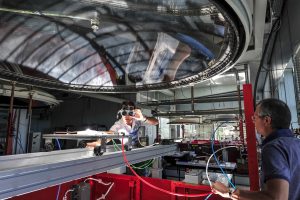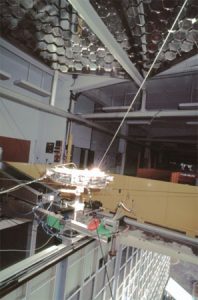CNRS – PROMES – Medium and Small Solar Furnaces (MSSF)
TA63 – CNRS-PROMES-MSSF
Location
Av. Professeur Félix Trombe
66120 Font-Romeu-Odeillo-Via, France

Description
Organisation Description
PROMES is a research unit of the National Centre for Scientific Research (CNRS) and is linked to the University of Perpignan (UPVD). The laboratory is located in three sites, namely Odeillo-Font Romeu (CNRS Solar furnaces), nearby Targasonne (central receiver solar facility in Thémis site), and Perpignan (Tecnosud business zone and University proximity). The staff of PROMES is comprised of about 150 employees working in three research groups and six technical/administrative departments. The three research groups are ‘materials under extreme conditions’, ‘next generation CSP’ and ‘storage and solar chemistry’. PROMES is leading or is involved in several European and national projects. It is notably currently leading the national project ‘laboratory of excellence’ SOLSTICE (Solar Energy: Science, Technology and Innovation for Energy Conversion) to improve solar research.
A very large spectrum of research areas is supported, either at high temperatures (from ambient up to 4000°C) and/or high flux (up to 16 MW/m2), from fundamental research to industrial developments (Technology Readiness Level (TRL) 3 to 7). This includes electricity production, energy storage (thermal latent or sensible, chemical, such as metallic foams for hydrogen,…), thermochemistry (solar fuels, synthetic fuels, hydrogen,…), physics (heat exchanger characterisation, spectrum manipulation,…), solar metallurgy and high temperature materials synthesis or characterisation ( aerospace, automotive, solar receivers, nuclear reactors,…), photophysics (high concentration PV, thermoionic conversion,…), biology (bioreactors, water treatment,…), industrial heat and processes hybridisation, space processes (components for probes including for NASA and ESA, moon/mars colonies…).
Research Infrastructure Description
The research infrastructure is comprised of 11 very high concentration solar furnaces, the MSSFs for Medium and Small Solar Furnace, with their 5 heliostats. The thermal power ranges from 1 to 6 kW, leading to experimental active sizes typically below 1 centimetre up to 10 centimetres. Maximum solar concentration reaches 16000 suns (16 MW/m2), leading up to 4000°C. The concentrated solar beam is natively provided either vertically (9 facilities) or horizontally (2 facilities). All the solar furnaces are equipped to accurately modulate power and flux density over wide ranges and very high dynamic control. This allows performing repeatable heating cycles, including with fast controlled temperature variations (above 1000°C/s), such as for thermal shocks or accelerated aging. Numerous PROMES-CNRS setups are available to external users for tests under air, vacuum, or controlled atmosphere, most with complex instrumentation, such as a fast solarblind multispectral IR camera. Auxiliary systems include compressed air, inert gas, special gases, and water cooling. The main set-ups used by external users and proposed here are, among other possibilities, the heliotron reactors (typically used either for nanomaterials synthesis or for material characterisation in a controlled atmosphere), water-cooled plates for any experiments under air, the SAAF set-up for accelerated aging under high flux, and one fluidised bed set-up (particles heating, chemical treatments,…).
Testing Capabilities
The facility features 11 high-concentration solar furnaces for testing materials with thermal power from 1 to 6 kW, capable of reaching up to 4000°C with concentrations up to 16,000 suns, offering versatile setups for heating, material synthesis, and accelerated aging under various conditions.
Technical Equipment
The facility includes 11 high concentration solar furnaces with thermal power from 1 to 6 kW, reaching up to 16 000 suns and 4000°C. Furnaces offer vertical or horizontal solar beams and are equipped for precise power modulation, fast temperature changes, and testing in various conditions. Key setups include heliotron reactors, water-cooled plates, SAAF for accelerated aging, and a fluidised bed.
Additional information
Technology Readiness Level: 4-6
Special considerations: N/A
Technology clusters: CSP/STE, Energy Storage, Materials for Energy
Website: http://www.promes.cnrs.fr
Availability: All year
Provision of tools to prepare data sets in a FAIR way: Yes

